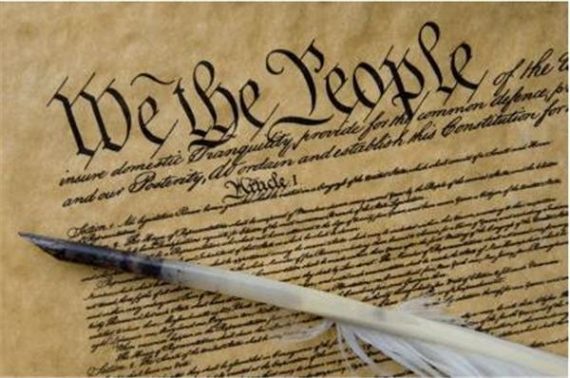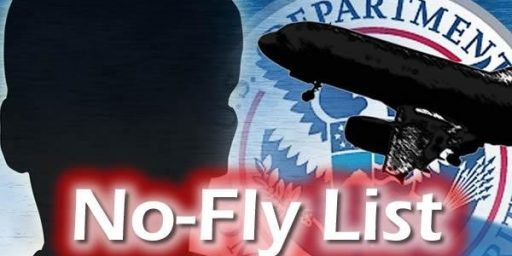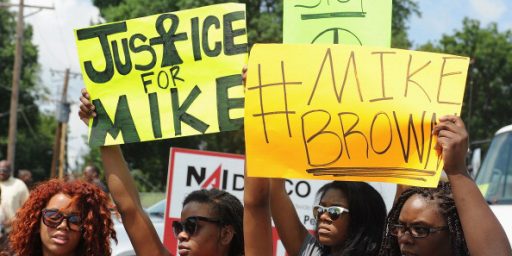Federal Judge Rules No-Fly List Unconstitutional
The right to fly can't be denied on mere whim.
The eleven-year-old policy of denying thousands of people the right to fly has been declared unconstitutional.
Reuters (“Federal judge rules U.S. no-fly list violates Constitution“):
The U.S. government’s no-fly list banning people accused of links to terrorism from commercial flights violates their constitutional rights because it gives them no meaningful way to contest that decision, a federal judge ruled on Tuesday.
U.S. District Judge Anna Brown, ruling on a lawsuit filed in federal court in Oregon by 13 Muslim Americans who were branded with the no-fly status, ordered the government to come up with new procedures that allow people on the no-fly list to challenge that designation.
“The court concludes international travel is not a mere convenience or luxury in this modern world. Indeed, for many international travel is a necessary aspect of liberties sacred to members of a free society,” Brown wrote in her 65-page ruling.
“Accordingly, on this record the court concludes plaintiffs inclusion on the no-fly list constitutes a significant deprivation of their liberty interests in international travel,” Brown said.
The decision hands a major victory to the 13 plaintiffs – four of them veterans of the U.S. military – who deny they have links to terrorism and say they only learned of their no-fly status when they arrived at an airport and were blocked from boarding a flight.
It has long struck me as obvious that the no-fly list—and, indeed, most of the requirements that US citizens demonstrate that they’re not criminals in order to engage in ordinary activities in the wake of the 9/11 attacks—are blatantly unconstitutional. It’s shocking that it’s taken more than a decade to strike down the no-fly list.
As noted later in the article, as of last year, the no-fly list “included some 20,000 people deemed by the FBI as having, or reasonably suspected of having, ties to terrorism,” of whom some 500 were citizens. It simply strains credulity that the government can have identified that many people as being sufficiently dangerous as to deny them the right to board public transportation, much less that the FBI should be able to do so on its mere word.
I haven’t read Brown’s opinion but presume that the Constitutional basis is found in the 5th Amendment which declares, in part, “No person shall be . . . deprived of life, liberty, or property, without due process of law.” There is, obviously, no specific “right to fly” enshrined in the Constitution, written as it was well before the Wright Brothers invented the airplane. But Brown, quite reasonably in my view, is arguing that being able to travel using modern means is a liberty interest that can’t be suspended by government without due process.
UPDATE: To be clear, I’m not arguing, and don’t think the judge was arguing, that there’s an absolute right to fly. Obviously, the government has substantial regulatory power here. No one is questioning the government’s power to, say, ban the carrying of firearms and explosives aboard the airplane. It’s perfectly reasonable to have some procedure to ban those who are a legitimate threat from flying and posing a tremendous risk to other passengers. But to deny what has become a fundamental liberty, there needs to be due process. My preference would be for the FBI to have to meet some minimal judicial review standard to add names in the first place. As a minimum, though, there has to be a speedy way for someone denied the ability to fly by virtue of their name appearing on the list to challenge the decision.






The key is that there is no meaningful way to contest the decision once you are put on the list.
Fix that…fix the problem.
@C. Clavin: but then they would have to provide actual evidence, that hardly seems fair to the Feds. /s
This is COMPLETELY off-topic, but I don’t know where else to address it. This is for Doug, because it is his area of expertise:
Doug, I’m waiting for you to grow a pair and address this Boehner-suing-Obama business. C’mon, now; don’t be scared …
While I think that this is the moral and just decision, I don’t understand why it is the legally correct decision. Why is this creeping government control over lives unacceptable, when so many other instances are acceptable?
There is no right to drive — it is defined as a privilege, which allows the privilege to be revoked immediately if you refuse to consent to a breathalyzer test, and which also allows the government to very strongly regulate who can drive, what they can drive, etc.
I would have expected flying (even as a passenger) to fall into this same “there is nothing in the constitution that says that you have a right to fly” grey zone given the amount of federal subsidies and control over the airports. Perhaps slightly adjusted to “sure you can fly, but you don’t have a right to be in the secure area of the airport, so good luck with that.”
@dennis: If you want a blog post, start your own blog. Besides, until such time that a lawsuit is filed so one would know the substance, what would be the point?
@dennis:
I’m not clear on how Boehner has standing to sue…but if he does he will be spending millions of dollars of our money to sue the President for doing his job because the Republican Caucus won’t do theirs.
Sounds perfectly logical to me…………….
@Gustopher:
The difference between this and driving is that there is no due process to this. If you get put on the list you are f’ed.
There is no right to fly…but if the Government decides you can’t then you have a right to due process. That right is being abridged.
@Gustopher:
There’s no right to drive, but there is a constitutional right to travel:
http://en.wikipedia.org/wiki/Freedom_of_movement_under_United_States_law
I remember an incident some years ago when a high school student inadvertently was placed on the no fly/terrorist suspect list and was even rounded up and sent to Leavenworth. It took weeks for the government to straighten this out and for the parents to get him back. Of course, no apology, amends, or monetary help from the government.
What is a mystery is how some people get on these lists. Government won’t say, but in this case it was a mix up with someone with a similar name.
@David in KC:
“Oh, stuff a sock in it, Geoffrey!”
@Gustopher: It’s the fact that you can’t challenge the decision. In fact, you can’t even get information on why they put you on the no-fly list in the beginning.
(Yippee!)
@Gustopher: As others have said, it’s true that there is no “right to drive”, however, the government can’t take away the privilege of driving without some sort of legal process that you can contest. That’s really what this case was about. It didn’t actually say that a no-fly list is per se unconstitutional. It says that the government has to allow you to contest it, and part of that process is to tell you why you’re on it in the first place.
Good.
As a constitutionalist, I am pleased with this decision.
@Gustopher: I think @Ben has this right. See update.
@James Joyner: That sounds right. But after so many years of police encroachment with the War On Terror, the War On Drugs and the War On Nouns, I am always surprised when the right decisions get made, and there isn’t some twisted argument to reduce the rights of the people further.
This and the cell phone case have left me completely stunned.
@Gustopher: Fair enough. The courts have historically bent over backwards to uphold laws that ostensibly aim at furthering the national security. Partly, that’s because they worry Congress and the president will simply ignore them if the don’t. But there have actually been many, many decisions post-9/11 that have sided with individual liberty over the national security state.
Does this decision have any practical consequences? As the process is still secret I don’t see how it helps me that I now know that I’m unconstitutionally not let on the airplane.
@Mu:
If they continue the current process unchanged after this ruling, the TSA agent preventing you from boarding would not be able to claim they reasonably believed they were acting in a constitutional fashion, and thus would not be protected by qualified immunity were you to sue them for their actions.
More good news. Perhaps the long post 9.11 decline of individual liberty has hit bottom.
@anjin-san: one can hope.
@Stormy Dragon: It wouldn’t be a TSA agent preventing me from boarding, it would be the computer at check-in. So I would have to sue the airline, which would claim to have acted as an agent for the government which would claim national security immunity. Doesn’t seem to be much of a change.
@James Joyner: ” Partly, that’s because they worry Congress and the president will simply ignore them if the don’t. ”
No, because the Supreme Court has also been willing to p*ss off Congress and the President.